Oltre l'integrazione. Un esercizio di immaginazione sociologica sulla migrazione
Journal title SOCIOLOGIA DEL DIRITTO
Author/s Andrea Brighenti
Publishing Year 2007 Issue 2006/3
Language Italian Pages 9 P. 139-147 File size 51 KB
DOI
DOI is like a bar code for intellectual property: to have more infomation
click here
Below, you can see the article first page
If you want to buy this article in PDF format, you can do it, following the instructions to buy download credits

FrancoAngeli is member of Publishers International Linking Association, Inc (PILA), a not-for-profit association which run the CrossRef service enabling links to and from online scholarly content.
This paper aims at incorporating the concept of migration into mainstream thinking and revealing that there are better ways of understanding it: rather than a sectoral phenomenon taking place within a specific social sub-system, it should be seen as an integral part of contemporary society. Accordingly, the theoretical stake when describing, understanding and researching migration points to the creation of concepts and categories for imagining societal structure and its change as a whole. The paper considers three conceptual shifts in the study of migration, constituting three progressive steps to overcome the curbs in the sociological capacity to imagine the phenomenon. The first one comprises overcoming the distinction between immigration and migration, entailing a passage from a nation state-based perspective of migration to a systemic (or ecological) view of migration. The nation state-based frame is already insufficient for understanding the broader socio-economic implications of migration, not to mention for intervening and regulating it. The second step is to overcome the assumption that migration is an essentially one-way process oriented towards the integration and final settlement of migrants. In this respect, integration can be regarded not so much as a ‘sociological problem’, i.e. a problem sociology faces in the description of external social phenomena, but more as a ‘problem of sociology’, i.e. a problem that calls sociology into question as a discipline, with both its conceptual apparatus and its links to the social world. Finally, the third step is to overcome a naturalist conception of territory and to undertake the consequent shift towards a relational conception of territory. This means that territory is not land, but a social process that need not be anchored in space, as it cuts across scale levels, visibility thresholds and actors themselves. A relational conception of territory ultimately enables migration to be regarded integrally as legal pluralism, radically understood, i.e. legal pluralism not simply as a coexistence of concurrent legal orders, but as a multiplicity of relational forms that shape the architecture of human interaction at each scale level.
Andrea Brighenti, Oltre l'integrazione. Un esercizio di immaginazione sociologica sulla migrazione in "SOCIOLOGIA DEL DIRITTO " 3/2006, pp 139-147, DOI: